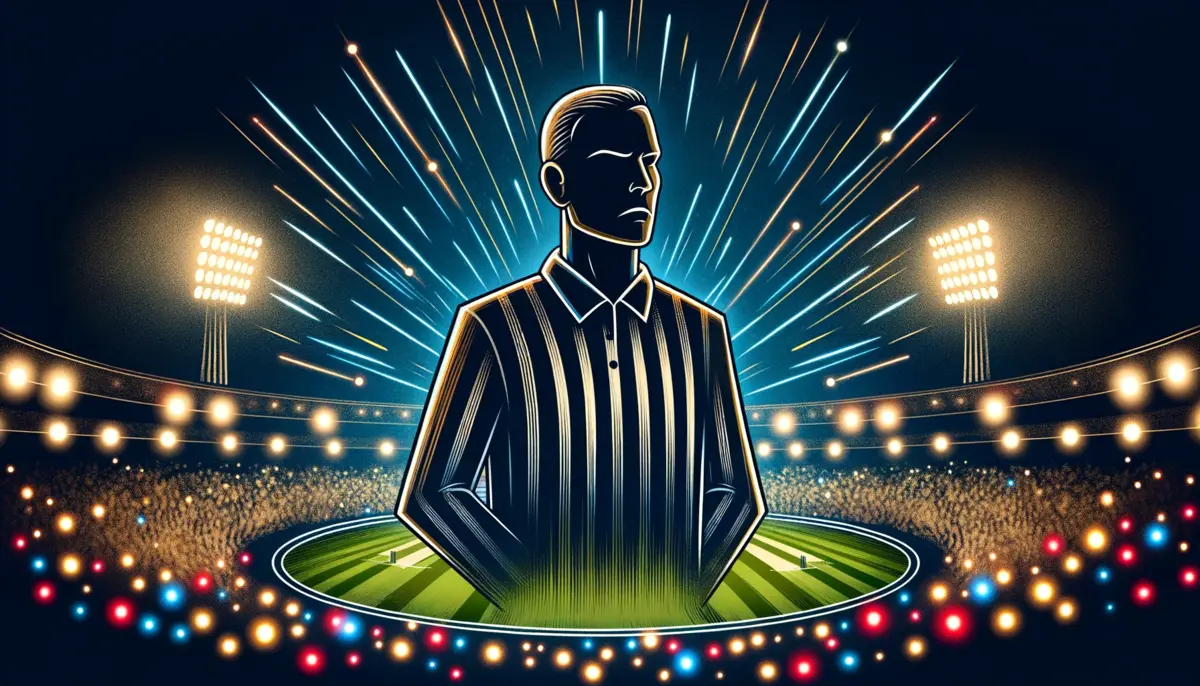Role and Significance of the Cricket Match Referee
Role and Significance of the Cricket Match Referee – Do you know the crucial role played by the cricket match referee?
They ensure fair play, enforce rules, and resolve disputes, all while maintaining the spirit of the game.
Up to 75% Reload Bonus on Aviator
Up to 75% Reload Bonus on Aviator
- Fastest Indian Rupees Withdrawals
- Fast deposits with UPI
- 300% Welcome Bonus up to ₹10,000
With their professionalism and integrity, they bring a sense of order to cricket matches.
In this article, you will learn about the significant impact these referees have on the sport, and how their decisions contribute to a liberated and enjoyable cricket experience.
Key Takeaways in This Article
ShowEnsuring Fair Play and Sportsmanship
To ensure fair play and sportsmanship during a cricket match, the match referee actively enforces the rules and regulations.
The role of the match referee is crucial in maintaining the integrity of the game and upholding the spirit in which it’s played.
It’s their responsibility to oversee the conduct of players, coaches, and officials throughout the match.
The match referee has the authority to make decisions regarding disciplinary actions, such as issuing warnings, fines, or even suspensions.
They closely monitor the players’ behavior on and off the field, ensuring that they adhere to the code of conduct.
By doing so, they help create an environment where fair play is valued and sportsmanship is encouraged.
Moreover, the match referee acts as a mediator in case of any disputes or conflicts that arise during the game.
They listen to both sides, consider the evidence, and make impartial judgments. This not only ensures fairness in decision-making but also promotes a sense of trust and respect among the teams.
Enforcing Rules and Regulations
You, as the match referee, have the responsibility of actively enforcing the rules and regulations of the cricket match.
It is essential to ensure fair play and maintain the integrity of the game. As the enforcer, you play a crucial role in upholding the spirit of cricket and ensuring that all participants adhere to the established rules.
To better understand your role, let’s take a look at a table summarizing some of the key rules and regulations you must enforce:
| Rule | Description | Importance |
|---|---|---|
| No-ball and Wide-ball | These are bowling infringements that result in additional runs for the batting team. | By penalizing bowlers for these actions, you prevent unfair advantages and maintain a level playing field. |
| LBW (Leg Before Wicket) | This rule determines if a batsman is out when the ball hits their leg before hitting the bat. | By making accurate decisions on LBW appeals, you ensure fairness and prevent any potential controversies. |
| Fielding Restrictions and Powerplays | These rules dictate the number of fielders allowed in specific zones during different phases of the match. | By enforcing these regulations, you ensure that teams comply with the predefined strategies and maintain a fair balance between batting and fielding. |
| Player Code of Conduct Violations | This includes actions like dissent, sledging, or physical altercations. | By penalizing players for violating the code of conduct, you maintain a respectful and sportsmanlike environment on the field. |
| Over-rate and Time Management | These rules ensure that teams complete a specific number of overs within the allocated time. | By monitoring and penalizing teams for slow over-rates, you keep the game flowing smoothly and prevent unnecessary delays. |
Enforcing these rules and regulations is essential for the smooth running of the game and maintaining a fair and competitive environment.
By actively addressing any breaches, you create an atmosphere of accountability and uphold the integrity of the sport.
In the next section, we will explore how you, as the match referee, play a pivotal role in resolving disputes and controversies that may arise during the cricket match.
Resolving Disputes and Controversies
As the match referee, you actively resolve disputes and controversies that may arise during the cricket match, ensuring fair play and maintaining the integrity of the game.
Your role is crucial in upholding the spirit of cricket and ensuring that the game is played in a fair and sportsmanlike manner.
When disputes occur, your primary responsibility is to listen to both sides and make an impartial decision based on the rules and regulations of the game.
You must assess the situation, consult with the on-field umpires if necessary, and apply your judgment to resolve the conflict.
Your decision should be fair, consistent, and in accordance with the laws of the game.
Controversies often arise due to disagreements over decisions made by the umpires.
In such cases, you play a vital role in reviewing the decisions and addressing any concerns raised by the teams.
You may have access to technology, such as the Decision Review System (DRS), which can assist in making accurate decisions.
Your ultimate aim is to ensure that the correct decision is reached, promoting transparency and fairness.
It is important to handle disputes and controversies with tact and diplomacy, maintaining open communication with the players, team officials, and fellow match officials.
Your ability to remain calm under pressure, exercise sound judgment, and communicate effectively is crucial in resolving conflicts and maintaining the integrity of the game.
Maintaining the Spirit of the Game
By upholding the spirit of the game, the match referee ensures fair play and sportsmanship among the players.
The spirit of cricket embodies values such as respect, integrity, and camaraderie. Here are four ways in which the match referee maintains the spirit of the game:
- Enforcing the Code of Conduct: The match referee ensures that players adhere to the code of conduct, which includes guidelines on player behavior, fair play, and respect for opponents and officials. By imposing sanctions for misconduct, the referee promotes a culture of sportsmanship.
- Promoting Fair Play: The match referee monitors the game to ensure fairness in player conduct, umpiring decisions, and adherence to the laws of the game. By addressing any unfair advantages taken by players, the referee ensures that the game is played in the right spirit.
- Mediating Disputes: In the event of conflicts or disputes between players, the match referee acts as a neutral mediator. By resolving conflicts promptly and fairly, the referee fosters an environment of mutual respect and cooperation among players.
- Educating Players: The match referee plays a crucial role in educating players about the spirit of the game. By organizing workshops, seminars, and training sessions, the referee helps players understand the importance of fair play, respect, and sportsmanship.
Bringing Professionalism and Integrity to Cricket Matches
The match referee brings a high level of professionalism and integrity to cricket matches by ensuring fair play, ethical behavior, and adherence to the rules of the game.
They play a crucial role in upholding the spirit of the game and maintaining the trust of both the players and the spectators.
Professionalism is at the core of a match referee’s responsibilities. They’re responsible for overseeing the conduct of the players, ensuring that they adhere to the rules and regulations.
They also play a key role in resolving any disputes that may arise during the match, making decisions based on their knowledge and experience.
By doing so, they ensure that the game is played in a fair and unbiased manner.
Integrity is another essential aspect of a match referee’s role. They’re responsible for ensuring that the game is free from any form of corruption, such as match-fixing or spot-fixing.
They work closely with the Anti-Corruption Unit of the cricketing authorities to ensure that the game remains clean and transparent.
In addition to their on-field duties, match referees also play a significant role in promoting ethical behavior among the players.
They set high standards of conduct and sportsmanship, encouraging players to compete in the right spirit and respect their opponents.
Conclusion
In conclusion, the cricket match referee plays a crucial role in ensuring fair play, enforcing rules, resolving disputes, and maintaining the spirit of the game.
Get up to ₹20,000 Bonus Every Week!
Get up to ₹20,000 Bonus Every Week!
- Easy Sign-Up and Deposits
- The Biggest Bonuses in India
- 450% Bonus up to ₹1,000,000
Their presence brings professionalism and integrity to cricket matches, ensuring that players and teams adhere to the highest standards of sportsmanship.
With their expertise and authority, the match referee contributes significantly to the overall success and integrity of the game.
Frequently Asked Questions (FAQs)
How Many Matches Does a Cricket Match Referee Officiate in a Year?
In a year, how many matches does a cricket match referee officiate?
The cricket match referee officiates a significant number of matches in a year, ensuring fair play and upholding the rules of the game.
What Qualifications and Experience Are Required to Become a Cricket Match Referee?
To become a cricket match referee, you need a deep understanding of the game, good communication skills, and experience in officiating matches.
Qualifications like umpiring courses and previous playing experience can also be beneficial.
How Are Match Referees Selected for Important Cricket Tournaments?
You’re wondering how match referees are chosen for big cricket tournaments.
Well, the selection process involves considering their experience, knowledge of the game, and ability to make fair decisions.
What Kind of Disciplinary Actions Can a Match Referee Take Against Players or Teams?
The match referee has the authority to take disciplinary actions against players or teams, such as issuing warnings, imposing fines, or even suspending players.
They play a crucial role in maintaining fair play and sportsmanship in cricket.
How Does a Match Referee Handle Instances of Player Misconduct or Unsporting Behavior?
When a match referee handles instances of player misconduct or unsporting behavior, they assess the situation, consult with the umpires, and make a decision.
They can issue warnings, impose penalties, or even suspend players, ensuring fair play and maintaining the spirit of the game.








